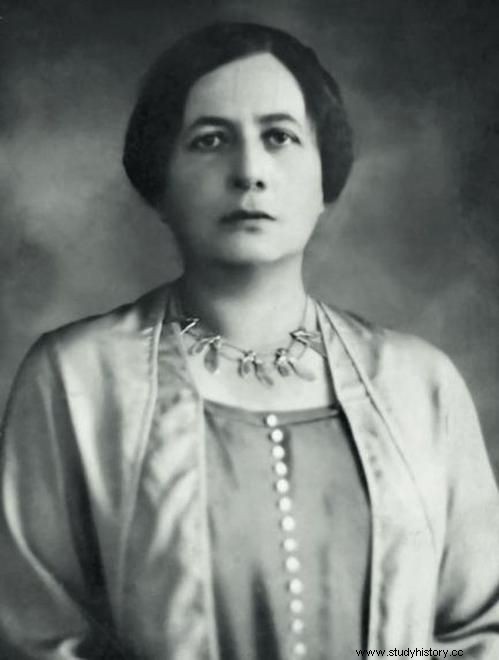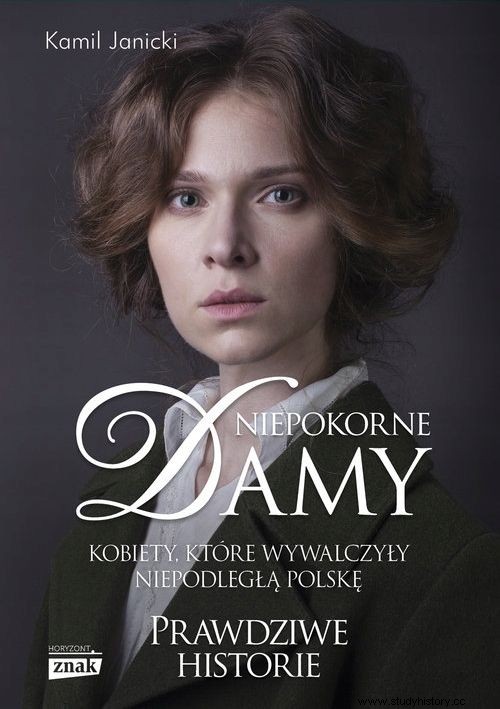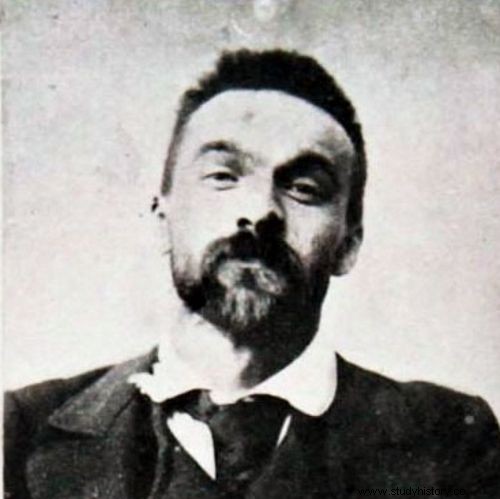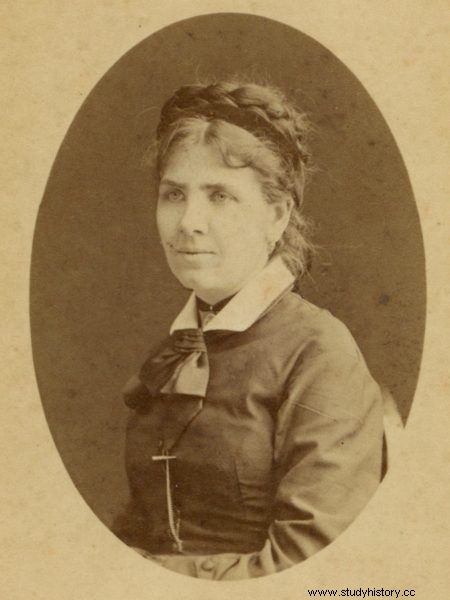Józef tried to convince his relatives that he did not fall in love and that he was marrying for purely cynical reasons. It's hard to believe, counting on how radical a move he decided for his chosen one.
The younger brother of the future Marshal, Jan Piłsudski, residing in Vilnius, recalled that he often saw Ziuk with Maria Juszkiewiczowa - a socialist known for her beauty and strength of conviction, who ran an influential socialist in Vilnius. Józef even competed with Roman Dmowski for Maria's favors, at least according to later accounts. And although he did not have two front teeth, and the years of his stay in Siberia left an imprint on his appearance, he surprisingly won over the young right-wing man.
It is known that Ziuk, who was growing up to be one of the leaders of the Polish Socialist Party, liked to stay in the apartment of the "Beautiful Lady" (as Juszkiewicz was called). Their long, flourishing relationship was not a secret to anyone, but Joseph's sudden announcement surprised his loved ones.
It's just business
In the early summer of 1899, he invited his three brothers to an interview and informed them that he intended to marry immediately. Jan immediately got the impression that "the marriage looked like a marriage for business, not for love," because "the wife is not legally responsible for her husband's actions in the event of his possible arrest."
I think that is exactly what Józef himself presented with cynicism and a strict distance. He claimed that he planned to settle down in a clandestine party printing press and that he "must have a person to run the household" . The whole initiative sounded more like a political ploy than any genuine relationship in any way.

Maria no longer Juszkiewicz, but Piłsudska. The photo was taken many years after the wedding, when the Piłsudski couple was experiencing a clear crisis.
Perhaps Ziuk really saw Maria in the first place as a trusted collaborator with whom he shared a common idea, and he dreamed not of a honeymoon with his beloved one, but of the regular clatter of printing fonts and clean long johns that someone else would displace. Maybe he liked to show off that he was too busy and politically committed to have time for love. Or maybe he was just ... he didn't want to look like a lazy weakling in front of his brothers and admit any feelings.
In the late nineteenth century, emotions, at least among men, were not of value. Maria had no such resistance. We know directly from her that in Vilnius she heard "words of love" from Józef. Above all, however, we know that Ziuk had to work a lot to win her hand. Much more than purely political considerations dictate.
Secret of the highest importance
Maria was a divorcee and also a Lutheran - although it is unclear whether she was born in this faith or switched to her to get rid of her first husband. In any event, no Catholic priest would remarry her and sanction her relationship with a member of the Roman Church. If Piłsudski wanted to achieve his goal, he had to reject the faith in which his mother raised him, officially leave the Church and accept the Evangelical-Augsburg rite.

Learn about the fate of women who won independence for Poland, and for themselves - freedom, voting rights and the dignity that have always been denied them. The latest book by Kamil Janicki, 'Niepokorne damy. Women who won an independent Poland ”now available for sale!
It was one of the most closely kept secrets of pre-war Poland. In a Catholic country where the cult of Józef Piłsudski grew to such an extent that even a law was adopted to protect his honor and good name (up to five years in prison for any calumnies against the Marshal), the mere suggestion that the leader became a "luther" in his youth , was considered a slander. All documents were hidden and witnesses were kept silent.
The truth was allowed to be whispered at best, and when it was brought to light by the opposing writings (which, by the way, happened only from the big bell), everyone thought it was an ordinary, and quite malicious, gossip.
Evidence that something was true was not discovered until the 1930s by Władysław Pobóg-Malinowski - a soldier and historian, known as the great marshal's apologist or even his propagandist. At the end of Józef Piłsudski's life, Pobóg-Malinowski collected materials for the Marshal's biography. He tried to document every detail of the leader's life, but when he got to the issue of his wedding with Maria Juszkiewiczowa, he found a peculiar, mysterious gap.
Nobody gave details of the ceremony; it was hard even to pinpoint its exact date. The researcher only got to the vague archival mentions, which showed that the wedding took place somewhere in the vicinity of Łomża or Białystok. Undaunted, he decided to tour all the local parishes. In each of them, he scrupulously searched the books, looking for that one particular Marshal's record. Still no result. All that was left was to surrender and accept that there was apparently chaos in the files, or ... to consider alternatives at least exotic. What if the wedding didn't take place in the church at all? What if it has not been given by a Catholic priest?

Józef Piłsudski after he was arrested by Ochrana in 1900. He must have looked similar when he married Maria Juszkiewicz.
Pobóg-Malinowski obtained a list of Protestant parishes and also began to tour them one by one. In the fifth or sixth row, he finally came across the document he wanted. But no one has had the opportunity to boast about the discovery made.
Censored biography of the Leader
The Marshal's biography - prepared for publication almost before his death - was subject to the strictest political censorship.
The author, as a famous Piłsudski, lieutenant of the Polish Army and head of the ministerial department of historical research, did not expect any difficulties. After all, he had written not so much a biography as a card:no, even the slightest word of criticism against the leader would have passed through his mouth. Nevertheless, the diadochi, tearing among themselves the honors, titles and areas of power left by the dying Marshal, outdid each other in remarks and biting comments. Pobog-Malinowski managed to calm them all down with difficulty; dispel almost every doubt. In the end, he was ordered to remove only one essential detail from the biography:the information that Piłsudski had renounced his faith.
The secret was kept through all the years of free Poland, during the occupation and the years of Stalinism. It came out for good only at the beginning of the 1960s, opening a fierce discussion not only between historians, but also people of the Church. Or actually two churches:because while the Protestants portrayed the father of independence as their forgotten brother in faith, Catholic circles gathered around Tygodnik Powszechny made great efforts to reduce the whole matter to political cynicism and strip it of any meaning.

Maria Juszkiewiczowa in another photo from her youth
In the course of the discussion, more documents began to come to light, shedding ever brighter light on the circumstances of the conversion. Thanks to them, it is possible to finally undermine the statement that Piłsudski decided to marry out of pure calculation.
This date was confirmed
It couldn't have been an impulsive, political decision, because the preparation for marriage alone took him several long months. The document of May 12, 1899 states that "Józef Klemens Piłsudski, thirty-one, bachelor" decided to change "from the Roman Catholic to the Evangelical-Augsburg denomination" and "was confirmed on that date, made a confession and received Holy Communion."
In the act of conversion, it was emphasized that Józef joined the ceremony only "after sufficient preparation", so he had to make efforts much earlier. Another few weeks passed before the long-desired wedding with a woman for whom Piłsudski was even ready to change his religion took place in the parish in Paprota Duży, fifty kilometers from Łomża and over three hundred from Vilnius.
On July 3, 1899, at ten in the morning, "a religious marriage was concluded between Józef Klemens Piłsudski, a bachelor, merchant, born in the estate in Zułów," and "Maria Kazimiera Juszkiewicz née Koplewska, divorced through her husband's fault, residing in Łapy, born in Vilnius ". Two of the groom's brothers were called as witnesses:"Adam Piłsudski, 29, an assistant to an architect" and "Jan Piłsudski, 23, a bank employee". The wedding intercourse "has not been concluded".
